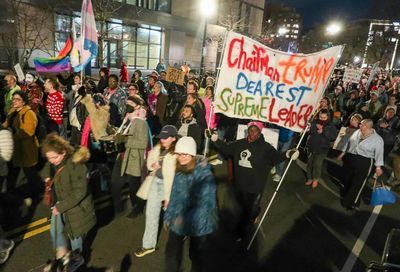South Carolina lawmakers strip LGBTQ protections from hate crimes bill
Republicans say explicitly mentioning LGBTQ protections will endanger the bill's passage in a GOP-led legislature.

On Thursday, a South Carolina House of Representatives subcommittee unanimously stripped explicit protections for members of the LGBTQ community from a hate crimes bill working its way through the state legislature.
South Carolina is currently one of only three states with no hate crimes statute on the books. As a result, prosecutors cannot attach additional penalties or enhancements to crimes motivated by bias or animus towards members of a particular group.
Under pressure from law enforcement, business leaders, civil rights and minority group advocates, and some religious communities, lawmakers have moved to pass a hate crimes statute. But there is limited time over the course of the next month — by which all bills must be passed, or else be delayed until the 2022 legislative session — to pass the bill, which was approved by the subcommittee and has been sent to the full House Judiciary Committee, which will take up the legislation next week.
Lawmakers on the Constitutional Laws subcommittee made several changes to eliminate certain parts of the bill that they thought would likely hinder its passage in the Republican-dominated legislature, reports the South Carolina newspaper The State.
Among those changes were the stripping of certain characteristics that could be used to target groups of people in bias-motivated crimes from the bill’s list of protected classes. The eliminated characteristics include gender, age, and ancestry, as well as sexual orientation. Gender identity was never included in the original version of the bill, despite protestations from LGBTQ advocates. As a result, the hate crimes bill will only provide protections for victims based on their race, color, religion, sex, or physical or mental disability.
House Judiciary Chairman Chris Murphy (R-Dorchester) was behind the move to reduce the number of protected classes, arguing that additional classes would have made the bill difficult to pass.
“If it was in that bill to say ‘sexual orientation,’ we have an issue in the body as a whole,” Murphy told The State in an interview. “We’re trying to mitigate that issue with the body as a whole. The goal is to keep the legislation moving down the track.”
Other changes to the bill included the changing of wording of penalties, allowing judges flexibility to give a penalty — usually prison time plus a fine — up to a certain threshold, rather than requiring a certain sentence for a hate crime.
See also: Merrick Garland: “It is the job of the Justice Department to stop” anti-trans hate crimes
Lawmakers also stripped out a civil component that would have allowed victims of property damage or those suffering personal injury because of a hate crime to sue for up to $25,000 in damages per violation. That provision was removed at the request of some conservative religious groups, who claimed it would be used to harass churches or groups for preaching or reading parts of the Bible that may offend someone.
Democratic House members on the panel ultimately voted for an amendment approving all the changes, but expressed concern about stripping away some of the explicit protections, including for sexual orientation.
“I do believe that we’re falling short from going as far as we should,” Rep. Justin Bamberg (D-Bamberg) said. “I don’t know that the class change covers what is and has been a problem, which is discrimination and hate crimes toward the homosexual community.”
But Rep. Weston Newton (R-Beaufort), who has been a proponent of eliminating or reducing the number of enumerated classes protected under the law, argued that the Supreme Court’s recent decision in Bostock v. Clayton County, Georgia — which dealt with employment discrimination — adopted the premise that laws extending protections based on “sex” apply to members of the LGBTQ community.
As such, Newton argued, the proposed hate crimes law can already be interpreted as protecting the LGBTQ community because it contains protections for sex, whereas explicitly enumerating “sexual orientation” could hinder its passage in the limited amount of time before the legislature adjourns in May.
See also: Mississippi trans woman’s slaying leads to calls for LGBTQ hate crime protections
LGBTQ advocates and allies blasted the decision to remove sexual orientation from the list of protected classes, with the Anti-Defamation League saying it was “appalled” at the move.
“Hate crimes targeting South Carolinians because of their sexual orientation or gender would be invisible under State law,” the ADL said in a statement, adding that the changes “not only would jeopardize the safety of some of the State’s most vulnerable populations, but it would severely damage South Carolina’s reputation as a welcoming state. It would send the unmistakable discriminatory message that only some South Carolinians are deserving of hate crime protections.”
Chase Glenn, the executive director of the Alliance for Full Acceptance, issued a statement criticizing the subcommittee’s decision.
“It’s incredibly disappointing to see that legislators today were willing to strip this bill of its provisions to include the LGBTQ community, but we are hopeful that the necessary language will be added back into the bill,” Glenn said. “The FBI has stated that hate crimes against LGBTQ people are on the rise and if we can’t count on our representatives to pass a hate crime bill that actually includes one of the communities most impacted by hate-motivated crimes, then what’s the point of having a hate crime bill?
“We aren’t asking for a radical piece of legislation. We’re asking that they model the language after federal hate crime legislation that includes both sexual orientation and gender identity,” he added. “We cannot play politics when the lives of LGBTQ people are at stake.”
In a follow-up interview with Metro Weekly, Glenn said he understood legislators’ concerns about being able to pass a bill with enumerated protections for LGBTQ people, but didn’t want to rely — as Newton does — on the assumption that the Supreme Court’s Bostock decision applies to the hate crimes bill.
He noted that lawyers have told him that any LGBTQ protections outside of employment — whether dealing with housing, credit, public accommodations, or hate crimes — will have to be litigated separately.
“If lawmakers want to protect LGBTQ folks from discrimination, it needs to be enumerated in the bill,” he said. “It’s not a safe assumption to make that Bostock would automatically apply. We don’t want to leave it up to interpretation.”
Read more:
Arkansas committee passes bill banning trans youth from accessing gender-affirming health care
North Carolina will list transgender students’ preferred names on their school records
Support Metro Weekly’s Journalism
These are challenging times for news organizations. And yet it’s crucial we stay active and provide vital resources and information to both our local readers and the world. So won’t you please take a moment and consider supporting Metro Weekly with a membership? For as little as $5 a month, you can help ensure Metro Weekly magazine and MetroWeekly.com remain free, viable resources as we provide the best, most diverse, culturally-resonant LGBTQ coverage in both the D.C. region and around the world. Memberships come with exclusive perks and discounts, your own personal digital delivery of each week’s magazine (and an archive), access to our Member's Lounge when it launches this fall, and exclusive members-only items like Metro Weekly Membership Mugs and Tote Bags! Check out all our membership levels here and please join us today!




















You must be logged in to post a comment.